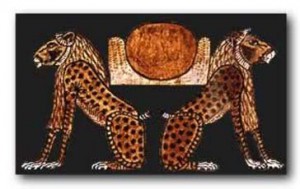Aker is an earth god who also presided over the western and eastern boarders of the Underworld. In early representations, Aker is shown as a narrow strip of land with a human or lion head at both ends But later he was shown as the foreparts of two opposing lions, sometimes with human heads, facing away from each other. One lion faces west while the other faces east. In between them is the sign of the horizon. In the later period of Egyptian theology the two lions making up the Akeru were named Sef and Tuau – ‘yesterday’ and ‘today’ respectively.
 Ancient Egyptian mythologists believed that during the night the sun journeyed through a tunnel that existed in the earth – its entry into the tunnel caused the night, its emergence again bringing the day once more. Each end of this tunnel was guarded by a lion god. It was Aker who opened the earth’s gate for the king to pass into the Underworld. He was also known to absorb the poison from the body of anyone bitten by a snake and he neutralizes the venom in the belly of a person who has swallowed an obnoxious fly. More importantly, he imprisons the coils of the snake, Apophis, after it is hacked to pieces by Isis, and Aker could, along his back, provide a secure passage for the sun-god’s boat as it traveled from west to east during the hours of the night.
Ancient Egyptian mythologists believed that during the night the sun journeyed through a tunnel that existed in the earth – its entry into the tunnel caused the night, its emergence again bringing the day once more. Each end of this tunnel was guarded by a lion god. It was Aker who opened the earth’s gate for the king to pass into the Underworld. He was also known to absorb the poison from the body of anyone bitten by a snake and he neutralizes the venom in the belly of a person who has swallowed an obnoxious fly. More importantly, he imprisons the coils of the snake, Apophis, after it is hacked to pieces by Isis, and Aker could, along his back, provide a secure passage for the sun-god’s boat as it traveled from west to east during the hours of the night.
From the tomb of Ramesses VI in the Valley of the Kings on the West Bank of Luxor (ancient Thebes), the tomb of Pedamenopet (26th Dynasty) at el-Asasif, also on the West bank at Luxor, and mythological papyri of the priesthood of Amun in the 21st Dynasty, it is even possible to reconstruct a “Book of Aker”, concerned with the solar journey. There was also a more threatening side to Aker that can be seen when he is pluralized as Akeru in the form of multiple earth gods. In passages from the Pyramid Texts, the Akeru are said not to seize the monarch, but later there is a general hope for everyone to escape the grasp of the earth gods. The Akeru appear to be primeval deities more ancient then Geb.